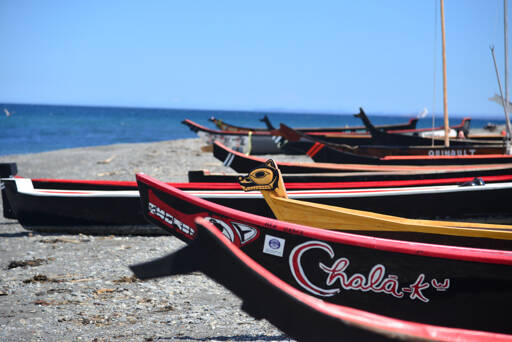PORT ANGELES — Hundreds of people were camped out across the Lower Elwha Klallam Reservation Sunday, with tents in front of homes, along the sides of roads and in public parks as canoers for the 2023 Paddle to Muckleshoot tribal canoe journey arrived at the beach at the end of Charles Road.
More than a dozen canoes landed at the reservation Sunday, many of them coming from Vancouver Island and others from the West End of the Olympic Peninsula. Their final destination is the Muckleshoot Indian Nation near Auburn, but along the way, they’ll stop at several communities to rest and celebrate indigenous culture.
“We started our paddle from Beecher Bay,” said Tyson Touchie Jr., 28, who’s from the Yuułuʔiłʔatḥ or Ucluelet First Nation near Tofino, British Columbia. “We all drove down and met over in the Sooke area.”
The canoe started at 7 a.m. Sunday, Touchie said, and crossed the Strait of Juan de Fuca in about six hours. He and his seven crewmates — all young men — were sprawled out on the grass, lightly napping after their journey.
“Definitely the last couple hours, the water was definitely starting to roughen up, a couple of white caps,” Touchie said. “But we found a more gentle area and we were shown a more gentle area.”
The canoes will leave from the Lower Elhwa reservation today, and Touchie said they were grateful to have some time to rest.
This is Touchie’s second canoe journey, the last time being the 2019 Paddle to Lummi, the last journey before a three-year hiatus due to the pandemic.
“It felt pretty good to paddle across that water,” Touchie said. “All my life I’ve been looking across that water and wondering how long of a paddle it would take. To finally do it, I can cross it off the list. I’ve got the bragging rights now.”
Tim Charles, 42, also started from Beecher Bay, where he lives. Charles’ crew of 18 has paddlers, or “pullers,” ranging in age from 13 to late their 40s, including Charles’ two sons, ages 13 and 16. This is the first journey for his kids, but Charles said he has done eight or nine, starting in 1999.
“This year we actually trained, and it actually showed in how everything on the water today,” Charles said.
Charles also said it took his crew about six hours to cross the strait, and that he was grateful to have a day to rest and to catch up with friends and family after the hiatus.
“It feels really good to me because I used to live here, so it’s like coming home again,” Charles said. “It feels good to be back on the water with all the families again, traveling how our ancestors traveled the water. It was our ancestral highways, so it’s good to be back on it again.”
Pullers make the journey by canoe, but they’re aided in their trip by ground crews that travel by car, bus or RV to each site to meet them with food, camping equipment and other amenities.
Richard Charles, 69, — a relative of the younger Charles — said he’s pulled in the past, but this year he’s driving the bus from the Beecher Bay First Nation west of Victoria.
The elder Charles said he was happy to see younger generations so involved in the journey, and that the trip was important for strengthening personal and community ties.
“What makes me proud is they’re more involved in their culture now instead of walking around in town or inside playing games and electronic things,” Charles said. “When they’re on the journey, they also get to meet new family members, make new friends, and by the time we’re finished, each of them knows each other pretty good. As we’re told, we’re all as one, we really thank each community we go to, and we thank them for coming into our community when they come our way.”
Charles said he was traveling with his children and grandchildren and that the journey will be a great memory for all of them. Elders like himself like to see younger generations embracing ancestral traditions, Charles said, and even though some of them were quite young, they were still making a good effort.
Charles also described the journey as a cathartic experience for those involved and said completing the trip can be a spiritual experience.
“Some people, when they start on the journey, they’re holding things in them, but as they’re paddling and stop in different communities and talk, one person says those words that you need to hear to let go to relieve themselves,” Charles said. “I was telling one of the pullers, I said, by the time you finish this journey, you’re going to feel a hell of a lot different, a lot lighter, because at each stop you go to, you’re letting something go at the words you hear.”
________
Reporter Peter Segall can be reached at peter.segall@peninsuladailynews.com.

